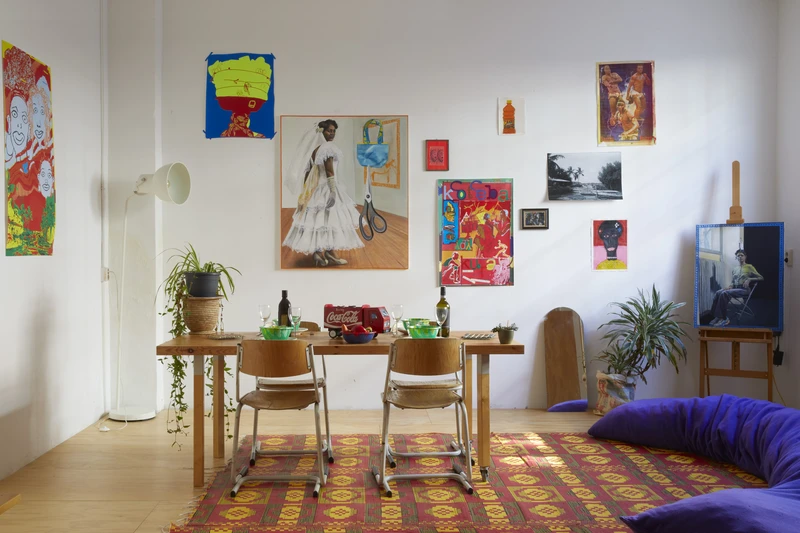Roxane Mbanga | NOIRES
21 Sep-15 Oct 2022
PV 21 Sep 2022, 6-8pm


“Take off your shoes. Walk on the paving stones. Your steps are guided by a vulnerable yet strong poem reading. The smell of Senegalese incense brings you warmth. Wind is coming from the rotating fan, caressing your skin. The braids and the Boubous dance at its rhythm. Silence. Video-collages and Super8 moving images start playing on the TV. Following the sound, walking through the braid curtain, you are now in the center. Analog photographs, embroideries, silkscreen and risograph prints are nailed on the red wall in front of you. Take a seat. You are in my home.”
San Mei Gallery presents the first solo exhibition in London by French-Guadeloupe-Cameroonian artist Roxane Mbanga. Positioning herself as a storyteller, Mbanga works across fashion, film, graphic design, photography, writing and performance. Her work explores the position of black women in public space under conditions of both hypervisibilisation and invisibilisation, providing space for public conversations around Afro-diasporic identity.
At San Mei Gallery, Mbanga presents NOIRES, an immersive multimedia installation imagined as an itinerant instalment of the artist’s home, featuring prints, textiles, moving image, sound, and plants as well as personal and everyday objects. NOIRES adapts to the spaces that host it, transforming for each context it inhabits, accumulating new objects and stories in its wake. The installation functions as an intimate space for welcoming, listening and exchanging around diasporic experiences. Activated by a public programme, it encourages audience members to discuss their own experiences of diasporic identity and perceptions of self.
Mbanga often looks to everyday cultural practices in fashion and design as material entry points into conversational engagements with broader political issues. At the centre of the installation a collection of braided hair suspended from metal scaffolding acts like a curtain, demarcating a space that is both domestic as well as discursive. Mbanga draws on the broader associations of black hair as an object of fascination under the gaze of white society, inviting members of the public to inhabit a space where the white gaze itself becomes an object.
In her artistic research, Mbanga takes inspiration from the boubou, a traditional unisex West African garment that fits loosely over the body, which the artist believes allows the wearer to feel a sensation of being naked underneath their clothing. Moments of interiority and exteriority echo throughout the exhibition, and are a central way in which Mbanga has come to understand self-perception and self-definition in public spaces crosscut by racism and sexism. Similarly, a series of repeating posters pasted on the front windows of the gallery encase the exhibition space in a translucent membrane, which plays at both publicity and privacy, gesturing towards an understanding of intimacy as inherently public and tied to the practices and politics of hospitality rather than merely existing between individuals.